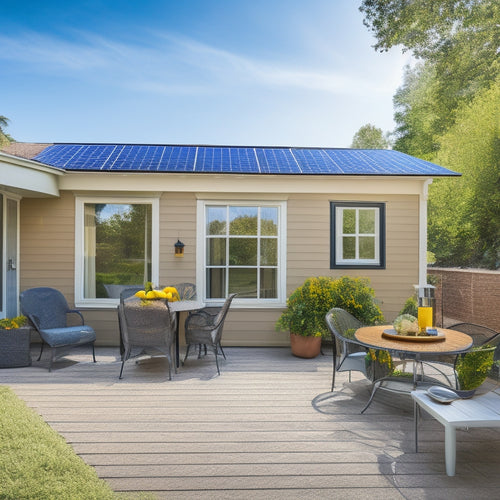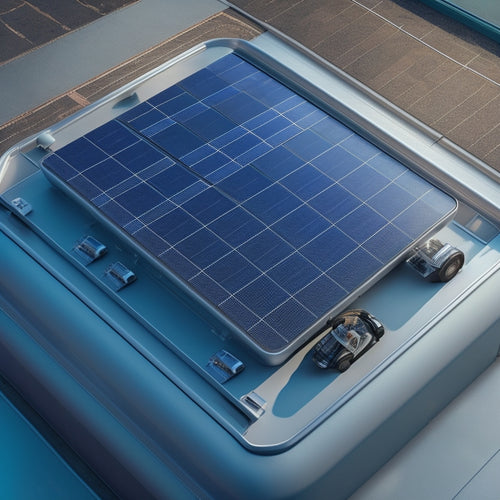
Why Invest in Residential Solar Panel Systems?
Share
By investing in a residential solar panel system, you'll harness renewable energy, reducing your carbon footprint and shrinking your impact on the environment. You'll save money on energy bills, and even increase your home's value - up to 15% in some cases. Plus, you'll benefit from government incentives like the 26% tax credit and state rebates. By going solar, you'll not only help the planet but also your wallet. And, as you explore the benefits of residential solar panel systems, you'll uncover even more advantages that make this investment a smart choice for your future.
Key Takeaways
• Harness renewable energy and reduce your carbon footprint with a sustainable and environmentally friendly source of power.
• Save money on your energy bills and generate cost savings through reduced reliance on traditional energy sources.
• Increase your home's value and gain a competitive edge in the real estate market with a highly desirable asset.
• Take advantage of government incentives, including a 26% tax credit, state rebates, and cash rebates or utility bill credits.
• Contribute to a healthier environment by shrinking your carbon footprint, improving air quality, and slowing global warming.
Renewable Energy for the Future
As you start on this journey of investing in residential solar panel systems, you're likely driven by a desire to harness renewable energy for the future, reducing your reliance on finite fossil fuels and mitigating climate change.
By integrating solar panels into your home, you're taking an important step towards creating a sustainable future.
One key aspect of this shift is energy storage. With the ability to store excess energy generated by your solar panels, you can guarantee a reliable supply of power even when the sun isn't shining. This not only provides energy independence but also enables you to contribute to the development of sustainable communities.
By investing in residential solar panel systems, you're playing a crucial role in shaping the future of renewable energy and paving the way for a cleaner, more sustainable tomorrow.
As you set out on this path, you'll be joining a growing community of like-minded individuals committed to reducing their environmental impact and creating a better future for generations to come.
Reduce Your Carbon Footprint Today
By investing in a residential solar panel system, you're not only generating clean energy but also reducing your reliance on fossil fuels, which in turn decreases greenhouse gas emissions and helps shrink your carbon footprint. This significant reduction in emissions contributes to a cleaner environment, making it an essential step towards adopting an eco-friendly lifestyle. By choosing sustainable living, you're playing an important role in mitigating climate change.
| Benefits | Environmental Impact | Your Contribution |
|---|---|---|
| Renewable Energy | Reduces greenhouse gas emissions | Shrinks your carbon footprint |
| Decreased Air Pollution | Improves air quality | Promotes public health |
| Energy Independence | Reduces reliance on fossil fuels | Supports sustainable living |
| Climate Change Mitigation | Slows global warming | Helps protect the planet |
Save Money on Energy Bills
Your residential solar panel system can greatly reduce your energy bills, putting more money back in your pocket. By harnessing the power of the sun, you'll rely less on the grid, resulting in significant cost savings.
With energy efficiency at its core, your solar panel system will optimize energy production, minimizing your reliance on traditional energy sources.
During billing cycles, you'll notice a substantial decrease in your energy expenditures. Rate comparisons will reveal the advantage of solar power, especially during seasonal fluctuations when energy demands are high.
By generating your own clean energy, you'll reduce your energy consumption from the grid, leading to lower bills and a smaller carbon footprint. With a solar panel system, you'll have the power to control your energy costs, shielding you from rate hikes and market volatility.
Increase Your Home's Value Fast
Installing a residential solar panel system can greatly enhance your home's value, making it a highly desirable asset in the real estate market. As a homeowner, you'll reap the benefits of property appreciation, which can lead to a significant increase in your home's value.
According to recent studies, homes with solar panels sell for up to 15% more than similar homes without them. This is because solar panels are seen as a valuable upgrade, much like a renovated kitchen or bathroom.
Additionally, having a solar-powered home can give you a competitive edge in your neighborhood. In a crowded real estate market, a solar panel system can be the deciding factor for potential buyers.
Government Incentives for Homeowners
The US government offers homeowners substantial financial incentives to invest in residential solar panel systems, including a 26% tax credit for qualified expenditures. You can claim this credit on your federal income tax return, reducing the amount you owe to the government. This incentive can greatly reduce the upfront cost of installing solar panels, making them more affordable for you.
In addition to the federal tax credit, many state governments offer rebates and incentives for homeowners who install solar panel systems. These state rebates can provide you with additional savings, often in the form of a cash rebate or credit on your utility bill. You can check with your state government to see what incentives are available in your area.
Frequently Asked Questions
How Long Does It Take to Install a Residential Solar Panel System?
"It'll take an eternity to get started, but in reality, you'll be harnessing the sun's energy in no time! Typically, the installation timeline takes around 2-5 days, pending the permitting process, which can add 2-6 weeks to the overall timeline."
Can I Install Solar Panels on an Old or Historic Home?
You can install solar panels on an old or historic home, but it's important to make sure the installation preserves the architectural integrity and doesn't compromise historic preservation guidelines, which may require special permits and careful planning.
Will Solar Panels Still Work During a Power Outage?
During a power outage, your solar panels won't provide electricity unless you have energy storage, like a battery, which allows you to maintain grid independence and keep the lights on when the grid goes down.
Can I Add More Solar Panels to My System Later On?
You can easily expand your system later, adding more solar panels as your energy needs grow, thanks to scalable system designs that allow for seamless system expansion and energy upgrades.
Are Solar Panels Resistant to Extreme Weather Conditions?
You'll be relieved to know that solar panels are designed to withstand extreme weather conditions, boasting impressive weather durability and storm resistance, ensuring your system remains operational even in harsh environments.
Related Posts
-

10 Tips to Buy Affordable Solar Panels Online
When purchasing affordable solar panels online, you'll want to research reputable retailers, compare prices, and chec...
-

Top Solar Panels for Car Battery Maintenance
When selecting top solar panels for car battery maintenance, consider high-efficiency models with high wattage output...
-

Planning for an Electric Vehicle-Friendly Urban Future
As you plan for an electric vehicle-friendly urban future, you'll need to integrate high-power charging stations, sma...


